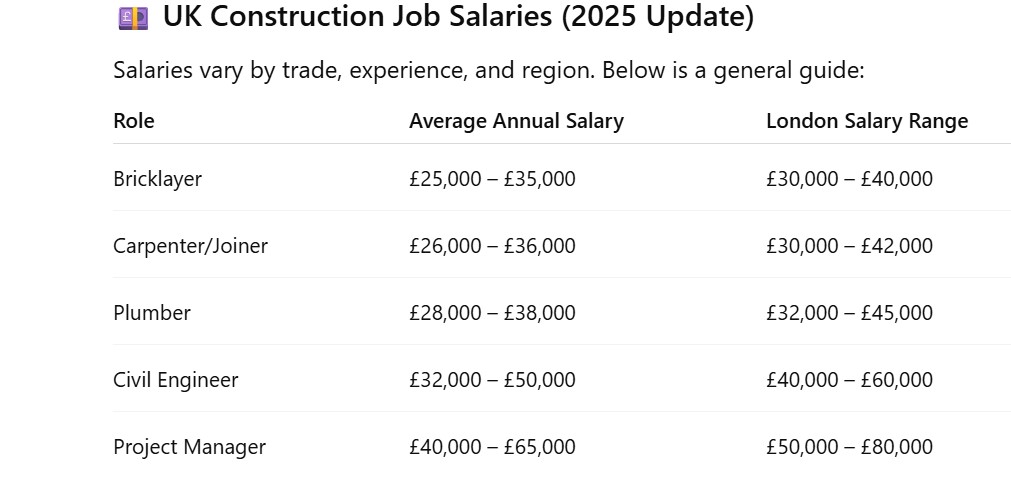Looking to build a better future in the UK? The construction industry continues to face a significant labor shortage, and overseas workers are in demand. If you’re seeking construction jobs in the UK with visa sponsorship in 2025, this guide will walk you through everything you need to know — from job types and salaries to visa requirements, application steps, and insider tips to maximize your chances.
Why the UK Construction Industry Needs Overseas Workers
The UK construction sector is experiencing an ongoing skills gap. Major infrastructure projects, housing developments, and commercial builds are underway across England, Scotland, Wales, and Northern Ireland — yet local workers alone can’t meet demand.
For overseas professionals, this means:
- Strong hiring demand in skilled trades and engineering.
- Visa sponsorship opportunities through the Skilled Worker visa.
- Competitive salaries and career growth potential.
Construction Roles Eligible for Visa Sponsorship in 2025
The Skilled Worker visa allows UK employers to sponsor foreign workers for specific roles on the Shortage Occupation List. Here are some of the most in-demand positions:
Skilled Trades
- Bricklayers
- Roofers
- Carpenters & Joiners
- Welders
- Plumbers & Pipefitters
Technical & Engineering Roles
- Civil Engineers
- Design & Site Engineers
- Quantity Surveyors
- Construction Project Managers
Tip: Skilled trades often require a CSCS card (Construction Skills Certification Scheme). Many employers will guide you through this after hiring.

Visa Salary Thresholds (2025):
- Minimum £26,200 per year (general Skilled Worker visa).
- £23,040 per year if the role is on the Shortage Occupation List.
UK Skilled Worker Visa Requirements for Construction Jobs
To qualify, you must:
- Have a confirmed job offer from a licensed UK employer.
- Meet the salary threshold (see above).
- Pass an English language test (IELTS, PTE, or equivalent).
- Prove your job is eligible (construction roles on shortage list).
- Apply online and pay visa fees + Immigration Health Surcharge.
Dependents (spouse & children) can join you in the UK.
Step-by-Step Guide: How to Apply
- Find a sponsoring employer
Search for UK companies listed on the gov.uk licensed sponsors list. - Secure a job offer
Employers issue a Certificate of Sponsorship (CoS). - Prepare documents
- Passport
- English test certificate
- Proof of funds (if required)
- Job offer letter & CoS
- Apply online via UK Skilled Worker visa portal.
- Attend biometric appointment at your nearest visa center.
- Wait for decision (average: 3–8 weeks).
Benefits of UK Construction Jobs with Visa Sponsorship
- Legal right to work in the UK with employer support.
- Stable income with opportunities for overtime.
- Pathway to permanent residency after 5 years.
- Family visa options for dependents.
- Access to the UK healthcare system (NHS).
Real Example: Overseas Worker Success Story
In 2024, a civil engineer from Nigeria secured a UK role through a Midlands-based construction firm. With sponsorship, he moved in under 4 months. Today, he earns £45,000 annually and is on track for permanent residency.
Frequently Asked Questions (FAQs)
1. Do UK construction jobs provide free accommodation?
Some employers offer temporary housing, but most provide only relocation support.
2. Can I switch employers after arriving in the UK?
Yes, but you’ll need a new Certificate of Sponsorship.
3. Do I need prior UK experience?
Not always — international experience is valued if you meet skill requirements.
4. How long is the Skilled Worker visa valid?
Usually 3–5 years, renewable, with the option for permanent residency after 5 years.
Final Thoughts
The UK construction industry continues to open doors for overseas workers in 2025. With high demand, clear visa routes, and competitive salaries, now is the time to apply.
Take Action Today:
- Check the Skilled Worker visa requirements.
- Browse the list of licensed UK employers.
- Get your CV updated and start applying to UK construction firms immediately.
Your opportunity to build a career and a life in the UK is closer than you think.